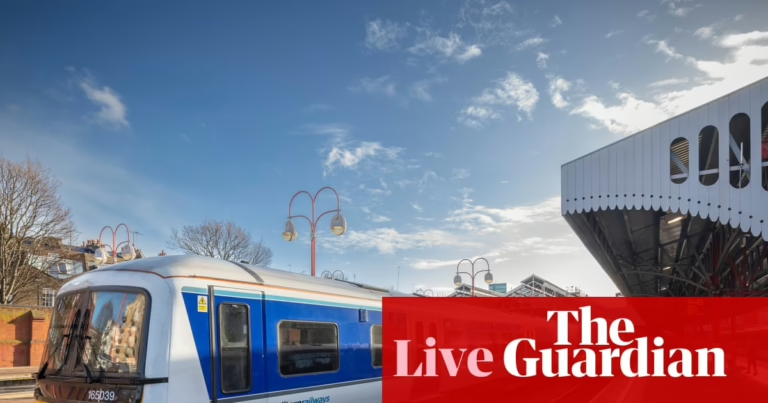Transport Secretary Announces Majority of Trains to Return to Public Ownership by Next Year
By mid-next year, the majority of rail services across Great Britain are set to be managed under public ownership, according to an upcoming announcement from the transport secretary.
At the Labour party’s annual conference, Heidi Alexander is poised to disclose the next quartet of train operators slated for nationalisation.
In her address, Alexander is anticipated to state:
“For decades, our railways have been operated primarily for private gain, within a flawed framework that repeatedly let down passengers.
This Labour administration is ending 30 years of disappointment, disunity, and dysfunction. We are restoring the railways to serve the travelling public.
Starting February next year, West Midlands Trains will be the next to transition into public hands.
Today, I can also confirm that Govia Thameslink Railway, Chiltern Railways, and Great Western Railway will follow suit.
We pledged this in our manifesto, and we are fulfilling that commitment.”
The transfer of West Midlands Trains will take effect on 1 February 2026, followed by Govia Thameslink Railway on 31 May 2026. Subsequently, Chiltern Railways and Great Western Railway (GWR) will also be brought under public control.
As the largest train operator in the UK, Govia Thameslink’s inclusion means that by mid-2026, approximately 80% of rail services will be publicly owned, Labour claims.
Before the year concludes, legislation to establish Great British Railways-the new body responsible for overseeing daily railway operations-will be introduced, the party has confirmed.
Aside from this major development, here is a brief overview of today’s key events:
- Morning: Children and Families Minister Josh MacAlister participates in morning media interviews.
- 11:30 AM: Keir Starmer visits central Liverpool ahead of the Labour conference.
- 12:00 PM: A demonstration by the Palestine Solidarity Campaign is expected outside the conference venue.
- 3:20 PM: Chancellor Rachel Reeves makes a visit to Southport.
- Saturday: Deadline for constituency Labour party (CLP) and affiliate nominations for the deputy leadership race.
Recent political updates in the UK include:
- Keir Starmer is set to caution Labour members that the party faces a “battle for the nation’s core values” and that history will judge harshly if his government fails to counter Reform UK and the populist right. Ahead of the conference, he emphasized that now is “not the moment for internal disputes.”
- A cybersecurity expert has raised concerns that Starmer’s proposed digital ID system could become a significant target for hackers. Despite opposition, the government plans to implement mandatory digital IDs-containing personal data such as photos, names, birthdates, nationalities, and residency status-by July 2029. A petition opposing the scheme has garnered over 1.5 million signatures.
- Labour has reinstated the party whip for John McDonnell and Apsana Begum, 14 months after it was withdrawn due to their rebellion over the two-child benefit cap. The decision followed discussions with Jonathan Reynolds, Labour’s new chief whip.
- Concerns are mounting that shared housing may become hotspots for anti-migrant protests. With the rise of Houses of Multiple Occupation (HMOs) as affordable options amid the housing crisis, some Reform UK politicians, including Warwickshire council leader George Finch, have criticized their use for accommodating asylum seekers.
Earlier this year, Starmer and Reeves proposed a planning bill in parliament aimed at dismantling environmental safeguards inherited from the EU, potentially exposing vital wildlife habitats to development threats. Following vigorous opposition from environmental advocates and some MPs, the government introduced amendments to bolster protections for nature. Despite these changes, officials maintain that the current level of deregulation remains insufficient.
Charles Banner KC, a legal expert with a background in human rights cases alongside Starmer, has been commissioned by the prime minister to explore options for eliminating the financial limits imposed on groups seeking judicial reviews. Banner’s experience includes high-profile cases involving Heathrow and Stansted airports, as well as the Abingdon reservoir project by Thames Water.
Related: Starmer enlists Conservative peer to draft planning legislation aimed at curbing judicial reviews
In a significant expansion of the government’s free breakfast initiative, Education Secretary Bridget Phillipson announced that an additional 500,000 children across England will soon gain access to free breakfast clubs. This expansion, supported by an £80 million investment, will see approximately 2,000 new schools joining the program next year, as part of Labour’s broader agenda for social reform.
Phillipson emphasized the transformative impact of this rollout, stating:
“The nationwide introduction of free breakfast clubs marks a historic shift in the daily lives of working families and exemplifies this Labour government’s commitment to fulfilling the promises made to the British public.”
“Labour is dedicated to fostering a fairer society by removing obstacles to opportunity and ensuring every child begins school prepared to succeed.”
“Our plan for change includes the expansion of free breakfast clubs and school-based nurseries, designed to support working parents and provide children with the best possible start.”
Further information regarding the breakfast clubs’ expansion will be released in the autumn, according to Labour officials.
Labour has reinstated the party whip for John McDonnell and Apsana Begum, more than a year after they were suspended for opposing the two-child benefit cap. This decision followed discussions with Jonathan Reynolds, who recently assumed the role of Labour’s chief whip.
Following the reinstatement, Begum affirmed her ongoing commitment to challenging the two-child limit, declaring she will “continue to expose the two-child limit at every opportunity.”

Keir Starmer is set to address the Labour party with a stark warning: the party is engaged in a crucial battle for the nation’s core values. He emphasized that history will judge harshly any government that fails to confront and overcome the challenges posed by Reform UK and the populist right-wing factions.
In an exclusive interview ahead of a pivotal leadership conference, Starmer urged party members to set aside internal disputes and self-reflection, stressing that now is the moment for unity and decisive action.
His comments are widely interpreted as a subtle critique of Andy Burnham, the Greater Manchester mayor, who some speculate could be a future contender for party leadership.

Starmer’s message underscores the urgency of rallying the party to face external political threats rather than succumbing to internal divisions, highlighting the high stakes involved in the upcoming political landscape.
Following a turbulent period marked by errors and resignations, the prime minister is set to visit Liverpool, where Labour currently trails Reform UK by 10 points in the polls.
In a recent interview, Keir Starmer emphasized the magnitude of the challenges facing his party, urging members to focus on the broader mission rather than internal disputes.
He stated:
“To everyone attending the conference, this moment presents a genuine chance to articulate our vision of patriotic national renewal, to reclaim patriotism and define it authentically.”
“History will judge us harshly if we fail to dedicate all our efforts to countering Reform UK. They represent a clear adversary with a harmful agenda that contradicts our nation’s values. This battle is visible and urgent. Victory is essential.”
While Starmer plans to outline his strategy for revitalizing the country, he will also caution Labour members against being sidetracked by rumors about his leadership stability.
Labour is encouraged to maintain unity and concentrate on the pressing political contest ahead.
Related: Keir Starmer to warn Labour that battle with Reform is ‘fight for soul of the nation’
By mid-next year, the majority of rail services in Great Britain are expected to be publicly owned, according to an announcement anticipated from the transport secretary.
At the Labour party’s annual conference, Heidi Alexander is set to disclose the next four rail franchises slated for public ownership.
In her forthcoming address, Alexander is expected to declare:
“For decades, our railways have prioritized private profit over passengers, operating under a flawed system that repeatedly let people down.”
“This Labour government is ending 30 years of fragmentation, failure, and frustration by returning rail services to public control.”
“Starting February next year, West Midlands Trains will be the first to transition into public ownership.”
“Today, I can also announce that Govia Thameslink Railway, Chiltern Railways, and Great Western Railway will follow suit.”
“We pledged this in our manifesto, and we are committed to delivering on that promise.”
The transfer dates are set as follows: West Midlands Trains on 1 February 2026, Govia Thameslink Railway on 31 May 2026, with Chiltern Railways and Great Western Railway (GWR) to follow thereafter.
Govia Thameslink, being the largest train operator nationwide, means that by next year, public ownership will cover approximately 80% of rail services, Labour asserts.
Additionally, legislation to establish Great British Railways-the new body responsible for managing daily railway operations-is expected to be introduced before the year’s end.
Before diving deeper into this development, here is a brief overview of today’s key events:
- Morning: Children and Families Minister Josh MacAlister participates in the morning media round.
- 11:30 am: Keir Starmer visits central Liverpool ahead of the party conference.
- 12:00 pm: A protest organized by the Palestine Solidarity Campaign is expected outside the Labour conference venue.
- 3:20 pm: Chancellor Rachel Reeves visits Southport.
- Saturday: Deadline for constituency Labour party (CLP) and affiliate nominations for the Labour deputy leadership candidates.
Recent political developments in the UK include:
- Keir Starmer warns Labour of a “fight for the soul of the nation”, emphasizing the necessity to confront Reform UK and the populist right decisively. Ahead of a crucial conference, he stressed that now is “not the time for introspection” or internal conflict.
- Concerns over digital ID plans have been raised by cybersecurity experts who caution that the proposed system could become a significant target for hackers. The government aims to implement mandatory digital IDs by July 2029, which would include personal data such as photographs, names, birthdates, nationalities, and residency status. Opposition is strong, with a petition against the scheme gathering over 1.5 million signatures.
- Labour reinstates the party whip for John McDonnell and Apsana Begum after 14 months, following their rebellion over the two-child benefit cap. The decision came after discussions with Jonathan Reynolds, Labour’s new chief whip.
- Rising tensions around shared housing have sparked fears of anti-migrant protests. Homes of Multiple Occupation (HMOs) have increased as affordable housing options amid the crisis, but some Reform UK politicians, including George Finch, leader of Warwickshire county council, have criticized their use for housing asylum seekers.
Transport Secretary Announces Majority of Trains to Return to Public Ownership by Next Year
A prominent union leader has expressed significant dissatisfaction with the Labour government’s inability to enact the rapid and extensive reforms it pledged during the last general election.
Matt Wrack, the general secretary of the NASUWT teachers’ union, highlighted that this frustration stems from “years of neglect” experienced by communities devastated by industrial decline, according to reports from the PA news agency.
“The so-called ‘left behind’ areas are frequently mentioned in political discourse, yet their aspirations and needs remain largely unaddressed. In these challenging environments, extremist groups exploit divisions by scapegoating migrants and refugees for governmental and economic shortcomings.
Failing to heed this warning could result in significant electoral setbacks for Labour in the upcoming May elections. The possibility of a Reform party-led government is becoming increasingly plausible.
For millions, the reality is that despite Labour’s promises, austerity continues unabated, public services remain underfunded, and the cost-of-living crisis persists.
Controversial policies such as changes to winter fuel payments and the two-child benefit cap reinforce public fears that, despite voting for change, the status quo endures under Labour.
Meanwhile, wealth accumulates among billionaires, while ordinary citizens bear the burden, and younger generations face dimmer futures than their predecessors.”
Wrack emphasized the necessity for the trade union movement to propose and advocate for a viable alternative, stating:
“This requires dedicating resources to a unified campaign and holding the Labour government accountable for its shortcomings.
It is futile to argue that the far right offers no solutions while simultaneously urging people to accept ongoing issues-such as the unresolved cost-of-living crisis, deteriorating public services, bleak employment prospects, and the chronic failure to provide adequate housing.”
Scottish Labour Faces Another Suspension Amid Calls for Transparency
Scottish Labour’s Foysol Choudhury has become the second Member of the Scottish Parliament (MSP) suspended by the party within a two-month span, according to the PA news agency.
The Lothian MSP is reportedly under administrative suspension pending an ongoing investigation. A Labour spokesperson affirmed the party’s commitment to thoroughly investigating all complaints but declined further comment due to the active inquiry.

“The Labour party treats all complaints with utmost seriousness, ensuring they are fully investigated in accordance with our procedures, and appropriate actions are taken,” a party representative stated.
Choudhury’s suspension follows that of fellow MSP Colin Smyth, who was suspended after being charged with possession of indecent images. This sequence of events has prompted SNP MP Kirsty Blackman to demand that Scottish Labour leader Anas Sarwar provide full disclosure regarding the suspensions.
“The public deserves complete transparency,” Blackman asserted. “With a series of scandals involving Labour figures such as Foysol Choudhury, Colin Smyth, Peter Mandelson, Morgan McSweeney, Paul Ovenden, and Angela Rayner emerging recently, voters are entitled to clear answers.”
“Regardless of the explanations, the accumulation of controversies on the eve of the party conference unmistakably signals a crisis within Labour.”
Starmer Enlists Conservative Peer to Draft Planning Legislation Curtailing Judicial Reviews
Keir Starmer has commissioned a Conservative peer to develop a new planning bill aimed at limiting environmental groups’ ability to use judicial reviews to delay major infrastructure projects, including the expansion of Heathrow Airport’s third runway.
Discussions are underway about potentially withdrawing from the Aarhus Convention, an international treaty ratified by the EU and other European nations that safeguards the right of campaigners to legally challenge large-scale developments such as waste facilities, nuclear plants, and highways.
Legal experts warn that such a move could undermine the UK’s constitutional framework and suppress legitimate environmental objections.
Rachel Reeves, the Chancellor, has prioritized Heathrow’s expansion as a cornerstone of economic growth, asserting it would position the UK as “the world’s most connected business hub.” The Treasury views the proposed legislation-which includes blocking what Reeves has described as “frivolous” judicial reviews on nationally significant infrastructure-as critical to commencing runway construction before the next general election.
Reeves has criticized environmental protections for species like bats and newts, arguing they have hindered the completion of key infrastructure projects. She maintains that economic growth must take precedence over Labour’s net zero climate commitments, stating, “growth underpins everything else.”

Earlier this year, Starmer and Reeves introduced a planning bill to Parliament that would override EU-derived environmental safeguards, potentially endangering vital wildlife habitats. Following advocacy from activists and MPs, amendments were added to enhance nature protections, though officials believe deregulation efforts remain insufficient.
Charles Banner KC, an expert in judicial reviews and former collaborator with Starmer on human rights cases, has been tasked by the Prime Minister to devise ways to eliminate cost caps for groups pursuing judicial reviews. Banner’s experience includes cases involving Heathrow, Stansted airports, and Thames Water’s Abingdon reservoir project.
Starmer Unveils Mandatory Digital ID System for UK Workers
Keir Starmer has revealed plans to introduce a compulsory digital ID system as a means of verifying employment eligibility within the UK.
The initiative has sparked diverse opinions, ranging from concerns about privacy and cybersecurity to recognition of its potential to streamline public services, aligning the UK with similar schemes already in place across Europe. Perspectives from eight individuals on this topic have been gathered.
Labour Party Conference Kicks Off in Liverpool
As Keir Starmer and other Labour figures arrive in Liverpool for the party’s annual conference, a series of images from newswires capture the event’s atmosphere.
The conference is scheduled from 28 September to 1 October at the Arena Convention Centre.




Government to Expand Free Breakfast Clubs to 500,000 More Children in England
Education Secretary Bridget Phillipson announced that an additional 500,000 children across England will soon benefit from the government’s free breakfast club initiative.
Supported by an £80 million investment, approximately 2,000 new schools are set to join the scheme next year, as part of Labour’s broader plan for societal improvement. This expansion is funded through the current spending review settlement.
“The nationwide rollout of free breakfast clubs marks a historic shift in the daily lives of working families and exemplifies this Labour government’s commitment to fulfilling the promises made to the British public,” Phillipson stated.
“Labour is choosing a path of renewal towards a fairer society-breaking down barriers to opportunity and ensuring every child begins school ready to learn.”
“Our plan for change includes the expansion of free breakfast clubs and school-based nurseries to support working parents and provide all children with the best possible start.”
Further information regarding the breakfast club programme’s rollout will be provided in the autumn.
Scottish Greens Aim for First Constituency MSP in Upcoming Holyrood Election
The Scottish Greens are targeting their inaugural constituency seat in next year’s Holyrood election, focusing on the Glasgow Southside constituency currently held by former First Minister Nicola Sturgeon, according to the PA news agency.
Local councillor Holly Bruce has been selected as the Green candidate for the seat, which Sturgeon has represented since 2011. Sturgeon is preparing to step down from Holyrood after serving as an MSP since the assembly’s inception in 1999.
The Greens hope Sturgeon’s departure will enhance their chances of securing the constituency, as all previous Green MSPs have been elected via the regional list under Holyrood’s proportional representation system.
“I have dedicated myself as a councillor for Langside over the past three years to fostering a stronger community, and I am eager to represent the Southside constituency as the Scottish Green voice for change,” Bruce said.
Bruce emphasized the party’s commitment to prioritizing people and the environment over corporate interests, combating racist and anti-migrant rhetoric, and condemning the ongoing genocide in Gaza.
“As your candidate for Glasgow Southside, I will always put people and planet before corporate greed, challenge the millionaires promoting racist anti-migrant narratives, and speak out against the horrific genocide in Gaza.”
Patrick Harvie, former Scottish Green co-leader and the party’s longest-serving MSP, praised Bruce’s previous electoral success and expressed confidence in her candidacy.
“Since her election, Holly has been a strong advocate for the local community, and I am confident she will be an outstanding candidate for the constituency,” Harvie said.
“Green support in Glasgow Southside has steadily increased, and we look forward to campaigning across Southside, Glasgow, and Scotland.”
Calls to End Two-Child Benefit Cap Intensify Ahead of Labour Conference
As the Labour party conference approaches, backbench MPs and trade unions have renewed demands to abolish the two-child benefit cap.
Several MPs from Liverpool, the conference’s host city, have written to the Prime Minister asserting that the cap is “one of the most significant contributors to child poverty in Britain today,” according to the PA news agency.
The debate over the cap’s future is among several welfare policy issues likely to provoke challenges from Labour members during the conference. Notably, Lucy Powell, former House of Commons leader and frontrunner for Labour’s deputy leadership, has previously advocated for its removal.
Earlier this year, Labour MPs compelled a reversal of Keir Starmer‘s proposed cuts to the benefits budget. However, Darren Jones, the Prime Minister’s Chief Secretary and senior Cabinet Office minister, recently described the benefits bill as “unsustainable in the long term,” signaling potential future disputes.
Starmer’s recently announced digital ID system, unveiled at a centre-left leaders’ conference in London, is also expected to face scrutiny during the event.
Additionally, senior Labour officials are anticipated to reveal plans for a new wave of “new towns” as part of the party’s agenda, according to the PA news agency.
Labour Reinstates Whip to Two MPs Who Rebelled Over Child Benefit Cap
Labour has reinstated the party whip to John McDonnell and Apsana Begum, 14 months after they were stripped of it for opposing the two-child benefit cap, The Guardian has learned.
The pair regained the whip following discussions with Jonathan Reynolds, Labour’s new chief whip appointed earlier this month.
Following the decision, Begum pledged to continue campaigning against the two-child limit.
“Child poverty is a matter of conscience for me: 44.6% of children in my constituency live in poverty,” she said. “Calls to abolish the policy are growing, including from the children’s commissioner and members of the government’s own child poverty taskforce.”
McDonnell and Begum were among seven MPs who lost the whip in July last year after supporting an amendment to the King’s Speech calling for the cap’s removal, a policy linked to rising child poverty.
Four other MPs suspended at the time-Rebecca Long-Bailey, Ian Byrne, Imran Hussain, and Richard Burgon-had their whip restored in February.
The final suspended MP, Zarah Sultana, has since left the party and is attempting to establish a new left-wing political group alongside Jeremy Corbyn, who was re-elected as an independent in the 2024 election.

Charities Warn of Potential Targeting of Shared Rental Properties by Anti-Migrant Groups
Concerns are mounting that houses shared by multiple tenants could become hotspots for anti-immigrant demonstrations, as local residents and advocacy groups report rising tensions in certain communities.
Houses in Multiple Occupation (HMOs) have surged in popularity as affordable housing options amid the ongoing housing shortage.
HMOs are properties where three or more unrelated individuals share living spaces such as kitchens or bathrooms. These accommodations often serve students, young workers, asylum seekers, or anyone facing financial constraints.
Social media platforms have seen calls to action against HMOs suspected of housing asylum seekers, with some users attempting to compile lists of such addresses.
For instance, a disused pub near Warrington in Cheshire was recently vandalized with graffiti stating “No HMOs” following rumors of its conversion into shared housing, although the local council confirmed no planning applications had been submitted.
Members of Reform UK, including George Finch, the youthful leader of Warwickshire County Council, have publicly criticized the use of HMOs for accommodating asylum seekers.
Far-right protests over the summer have partly been fueled by misleading and provocative statements from politicians such as Nigel Farage, leader of Reform UK, and Robert Jenrick, the shadow justice secretary.
The Home Office has pledged to close numerous asylum hotels early next year, with plans underway to relocate asylum seekers to military barracks instead.
However, speculation continues about whether HMOs might be increasingly utilized for asylum accommodation, a move that has already sparked community friction independent of the asylum debate.
Louise Calvey from Asylum Matters, an organization advocating for improved asylum conditions, reported a rise in hate crimes near HMOs and noted the spread of rumors about migrant occupancy, even when untrue.
Over 1.6 Million Oppose Starmer’s Digital ID Card Proposal via Petition
Kyriakos Petrakos
A petition opposing the mandatory introduction of digital ID cards in the UK has garnered more than 1.6 million signatures. This follows Keir Starmer‘s announcement that such IDs will be compulsory for workers by 2029.
The petition argues that compulsory registration with a government-controlled ID system represents a dangerous step toward widespread surveillance and digital authoritarianism.
While petitions exceeding 100,000 signatures are eligible for parliamentary debate, their influence on actual policy remains limited, as seen with a previous petition demanding the reversal of Brexit that attracted over six million signatures.
Starmer described digital ID as a significant advancement for the UK, aiming to address civil liberties concerns amid ongoing debates.
“I understand the concerns of working people about illegal immigration. Securing borders and managing migration responsibly are legitimate demands, and this government is committed to delivering on them.”
“Digital ID offers a tremendous opportunity to strengthen border security by making it harder to work illegally.”
He emphasized that the proposed “Brit card” would simplify identity verification for accessing essential services, eliminating the need to search for outdated documents like utility bills.
However, civil rights advocates, including Silkie Carlo of Big Brother Watch, warn that the system could erode freedoms and create an extensive domestic surveillance network encompassing citizenship, welfare, taxation, healthcare, and possibly internet activity.
Chancellor Advocates for Youth Mobility Scheme and Inclusion of EU Trade Gains in Economic Forecasts
In an interview with the Times, the chancellor expressed a desire for the Office for Budget Responsibility (OBR) to factor in the enhanced EU trade agreements negotiated by Labour when preparing economic projections.
She also revealed plans for an ambitious youth exchange program, which would allow young people from the UK and Europe to live, study, and work across borders for extended periods.
While highlighting the economic advantages of this initiative, the Times noted potential challenges, including an estimated 50,000 Europeans annually becoming eligible to reside in the UK, potentially complicating migration management.
Labour Chair Acknowledges Party’s Recent Difficulties Amid Leadership Speculation
Anna Turley, chair of the Labour party, acknowledged to the PA news agency that the party has faced a “challenging couple of weeks,” especially with calls for Andy Burnham to contest the prime ministership.
Nonetheless, she emphasized that many MPs are frustrated by early attempts within the party to undermine Keir Starmer‘s leadership.
Keir Starmer Declares Labour’s Struggle Against Reform UK as a ‘Battle for the Nation’s Soul’
Keir Starmer is set to address the Labour party, framing the contest against Reform UK and the populist right as a crucial fight for the country’s core values. He warned that history would judge harshly any government that fails to confront this challenge.
Ahead of a pivotal party conference in Liverpool, Starmer urged members to avoid internal divisions and focus on the broader political battle, a message interpreted as a subtle critique of Andy Burnham, the Greater Manchester mayor and potential leadership contender.

Starmer highlighted the urgency of the moment, noting Labour’s current 10-point deficit to Reform in polls and the need to reclaim patriotic values.
“To everyone attending the conference, this is a unique chance to present our vision of patriotic national renewal, to reclaim patriotism and define it authentically.”
“We cannot afford to waste energy; we must defeat Reform. Their agenda threatens our nation’s fabric and contradicts our history. The battle is clear and must be won.”
While outlining his vision for national rejuvenation, Starmer also cautioned against distractions from leadership speculation within Labour.
Transport Secretary Announces Majority of UK Rail Services to Return to Public Ownership by Mid-2026
By mid-next year, most train services across Great Britain will be publicly owned, according to an announcement expected from the transport secretary at the Labour party’s annual conference.
Heidi Alexander will disclose plans to bring four additional rail operators under public control, including West Midlands Trains, Govia Thameslink Railway, Chiltern Railways, and Great Western Railway (GWR).
“For decades, our railways have prioritized private profits over passengers, resulting in repeated failures and fragmentation.”
“This Labour government is ending 30 years of disappointment by returning rail services to public stewardship.”
“West Midlands Trains will be publicly owned starting 1 February 2026, followed by Govia Thameslink Railway on 31 May 2026, with Chiltern Railways and GWR to follow.”
“We pledged this in our manifesto, and we are fulfilling that commitment.”
Govia Thameslink Railway is the largest train operator in the UK, meaning that by next summer, approximately 80% of rail services will be publicly managed.
Legislation to establish Great British Railways, the new body overseeing daily rail operations, is slated for introduction before year-end.

Additional highlights for the day include:
- Morning: Children and Families Minister Josh MacAlister participates in media interviews.
- 11:30 AM: Keir Starmer visits central Liverpool ahead of the party conference.
- 12:00 PM: Palestine Solidarity Campaign plans a protest outside the Labour conference venue.
- 3:20 PM: Chancellor Rachel Reeves visits Southport.
- Saturday: Deadline for constituency Labour party (CLP) and affiliate nominations for deputy leadership candidates.
Recent political developments include:
- Keir Starmer framing Labour’s contest with Reform UK as a defining national struggle, urging unity and focus.
- Warnings from cybersecurity experts about the risks of Starmer’s digital ID plan, which faces widespread public opposition.
- Labour reinstating the party whip to John McDonnell and Apsana Begum after their previous suspension over dissent on the two-child benefit cap.
- Growing concerns over anti-migrant protests targeting HMOs, with criticism from Reform UK politicians regarding asylum seeker accommodation.
Labour Party Conference Debates Public Ownership of Railways
At the recent Labour Party conference, the future of the UK’s rail system took center stage, sparking intense discussions about the merits of public ownership. Party leaders and delegates debated the potential benefits of bringing the railways back under state control, emphasizing improved service quality and accountability.
Keir Starmer, the Labour leader, highlighted the party’s commitment to transforming the rail industry by prioritizing passengers over profits. He argued that public ownership could lead to more reliable and affordable transport, contrasting it with the current privatized model, which many critics say has led to fragmented services and rising fares.
Rachel Reeves, shadow chancellor, reinforced this stance by pointing out the inefficiencies and challenges faced by private operators. She suggested that a publicly owned rail network would enable better long-term planning and investment, ultimately benefiting communities across the UK.
Supporters of nationalization drew parallels with other countries where state-run railways have successfully delivered high standards of service and innovation. For instance, Germany’s Deutsche Bahn and Japan’s JR Group were cited as examples where public ownership has fostered efficiency and customer satisfaction.
However, the debate also acknowledged the complexities involved in transitioning to public ownership, including financial implications and the need for robust management structures. The Labour Party pledged to develop a clear, pragmatic plan to address these challenges while ensuring the railways serve the public interest.
As the conference concluded, it was clear that the issue of rail nationalization remains a pivotal topic within UK politics, reflecting broader discussions about the role of government in essential services and the future direction of the country’s infrastructure.




















